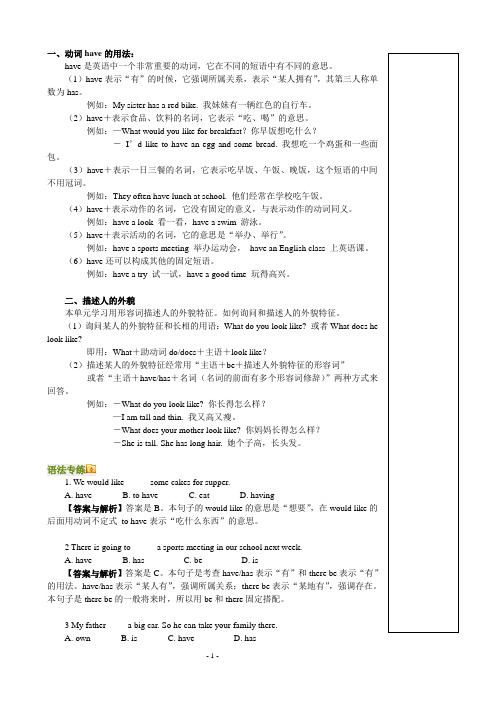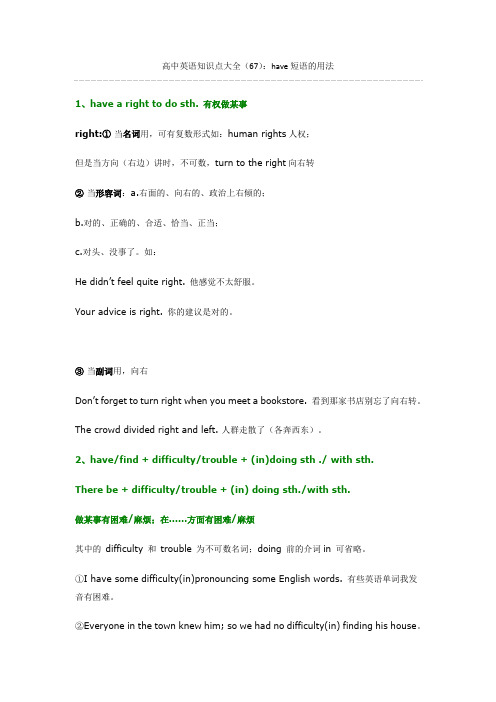have短语
- 格式:doc
- 大小:45.50 KB
- 文档页数:4

have的意义和用法1. have的基本意义和用法have是一个常见的英语动词,其基本意义是“拥有”或“持有”。
它可以表示一个人或物体具有某种东西,或者处于某种状态。
have可以用作实义动词和辅助动词。
1.1 实义动词作为实义动词时,have表示拥有、持有或具备某种东西。
例如:•I have a car.(我有一辆车。
)•She has a beautiful house.(她有一所漂亮的房子。
)在这些句子中,have表示主语拥有某个物品。
have还可以表示经历、感受、经受等。
例如:•We had a great time at the party.(我们在派对上玩得很开心。
)•He had a difficult childhood.(他度过了艰难的童年。
)在这些句子中,have表示主语经历了某种经历或感受到了某种情绪。
1.2 辅助动词作为辅助动词时,have用来构成完成时态和完成进行时态。
例如:•I have finished my homework.(我已经完成了我的作业。
)•She has been studying English for three years.(她已经学习英语三年了。
)在这些句子中,have与动词的过去分词形式构成完成时态和完成进行时态。
2. have的其他用法除了基本的意义和用法外,have还有一些其他常见的用法。
2.1 have tohave to表示“必须”或“需要”。
它用于表达义务、责任或强制性要求。
例如:•I have to go to work early tomorrow.(我明天必须早点去上班。
)•She has to study for the exam.(她需要为考试而学习。
)在这些句子中,have to表示主语被迫或有责任做某事。
2.2 have gothave got是have的口语形式,表示“拥有”。
它在口语中更常见,并且可以用于所有时态。

万能词have的用法一、have的基本含义和用法1.1 have作为动词意味着“拥有”或“具备”•表示物品的所有权,例如:–I have a car.(我有一辆车。
)–She has three cats.(她有三只猫。
)•表示人们所具备的特质或能力,例如:–He has a great sense of humor.(他有很强的幽默感。
)–They have a lot of experience in this field.(他们在这个领域有很多经验。
)1.2 have用作情感或感觉的动词•表示经历或感受到某种情感或感觉,例如:–I have a headache.(我头疼。
)–She has a feeling of frustration.(她有种挫败感。
)二、have的其他用法2.1 have作为助动词•表示完成时态,例如:–They have gone to the cinema.(他们去电影院了。
)–He has finished his homework.(他完成了作业。
)2.2 have作为帮助构成某些动词短语•have + to + 动词原形,表示义务或必要性,例如:–I have to study for the exam.(我得为考试学习。
)–She has to finish the report by tomorrow.(她必须在明天之前完成报告。
)•have + 动词的过去分词,表示完成或被动的意义,例如:–We have finished our project.(我们完成了我们的项目。
)–The book has been read by many people.(这本书已经被很多人读过。
)2.3 have用作动词与介词的搭配•have + 宾语 + 介词短语,表示拥有或进行某种行为,例如:–He has a cup of coffee in the morning.(他早上喝一杯咖啡。

一、动词have的用法:have是英语中一个非常重要的动词,它在不同的短语中有不同的意思。
(1)have表示“有”的时候,它强调所属关系,表示“某人拥有”,其第三人称单数为has。
例如:My sister has a red bike. 我妹妹有一辆红色的自行车。
(2)have+表示食品、饮料的名词,它表示“吃、喝”的意思。
例如:—What would you like for breakfast?你早饭想吃什么?-I’d like to have an egg and some bread. 我想吃一个鸡蛋和一些面包。
(3)have+表示一日三餐的名词,它表示吃早饭、午饭、晚饭,这个短语的中间不用冠词。
例如:They often have lunch at school. 他们经常在学校吃午饭。
(4)have+表示动作的名词,它没有固定的意义,与表示动作的动词同义。
例如:have a look 看一看,have a swim 游泳。
(5)have+表示活动的名词,它的意思是“举办、举行”。
例如:have a sports meeting 举办运动会,have an English class 上英语课。
(6)have还可以构成其他的固定短语。
例如:have a try 试一试,have a good time 玩得高兴。
二、描述人的外貌本单元学习用形容词描述人的外貌特征。
如何询问和描述人的外貌特征。
(1)询问某人的外貌特征和长相的用语:What do you look like? 或者What does he look like?即用:What+助动词do/does+主语+look like?(2)描述某人的外貌特征经常用“主语+be+描述人外貌特征的形容词”或者“主语+have/has+名词(名词的前面有多个形容词修辞)”两种方式来回答。
例如:-What do you look like? 你长得怎么样?—I am tall and thin. 我又高又瘦。

高中英语知识点大全(67):have短语的用法1、have a right to do sth. 有权做某事right:①当名词用,可有复数形式如:human rights人权;但是当方向(右边)讲时,不可数,turn to the right向右转②当形容词:a.右面的、向右的、政治上右倾的;b.对的、正确的、合适、恰当、正当;c.对头、没事了。
如:He didn’t feel quite right. 他感觉不太舒服。
Your advice is right. 你的建议是对的。
③当副词用,向右Don’t forget to turn right when you meet a bookstore. 看到那家书店别忘了向右转。
The crowd divided right and left. 人群走散了(各奔西东)。
2、have/find + difficulty/trouble + (in)doing sth ./ with sth.There be + difficulty/trouble + (in) doing sth./with sth.做某事有困难/麻烦;在……方面有困难/麻烦其中的difficulty 和trouble 为不可数名词;doing 前的介词in 可省略。
①I have some difficulty(in)pronouncing some English words. 有些英语单词我发音有困难。
②Everyone in the town knew him; so we had no difficulty(in) finding his house。
镇上所有的人都认识他,所有我们毫不费力就找到了他的家。
③The boy had little difficulty with maths. 这孩子学数学没困难。
④There was much difficulty (in) finding him. 好不容易才找到他。

have的四种使役用法使役动词have 在中学英语课本中常有所见。
归纳起来有四种基本句型:一、“have +人或物+过去分词”此结构常表示“让人做某事”。
这时,山过去分词充当的宾语补足语动词不是由使役动词的主语来完成;宾语和宾语补足语之间是被动关系。
例如:I have my hair cut once a week.She intended to have her daughter educated in China.她打算让她女儿到中国来念书( 受教育) 。
另外,这种结构中的have 有时也表示“受……影响”、“蒙受……”及“遭遇到某事”的意思。
Workers in some industries have their hearing harmed by thenoise of the machines.He had his leg injured trying to save a child.在救一个小孩时,他的腿受了伤。
He has had his hand burned.他把手烫了。
She had her watch stolen.她的表给人偷了。
二、“have +宾语+现在分词”,此结构表示“让( 使) 某人做某事”、“让( 使) 某物处于某种状态”,用于否定结构则表示“不能让”、“不允许”的意思,宾语补足语的动作是宾语发出,它们是主动关系。
例如:The two men had their lights burning all night long.They tried to have her talking.But no use.Don't have the horse running so fast;it's dangerous.We can't have that sort of thing happening.我们不能允许发生这样的事。
I will not have you talking to Mother like that.我不能让你和妈妈这样说话。

万能词have的用法万能词have的用法Have是英语中非常常见的一个词汇,它有多种不同的用法和意思。
在这里,我们将详细介绍have的各种用法和例句。
一、作为动词1. 表示拥有Have可以表示“拥有”的意思,例如:I have a car.(我有一辆车。
)She has two cats.(她有两只猫。
)2. 表示经历或经受Have也可以表示“经历”或“经受”的意思,例如:I have had a great time on my trip.(我在旅行中度过了美好的时光。
)He has experienced many difficulties in his life.(他在生活中经历了许多困难。
)3. 表示完成某项任务或动作Have还可以表示完成某项任务或动作的意思,例如:I have finished my homework.(我已经完成了我的家庭作业。
)She has cooked dinner for us.(她为我们做了晚餐。
)4. 表示发生或存在Have还可以表示“发生”或“存在”的意思,例如:There has been an accident on the highway.(高速公路上发生了事故。
)She has a lot of friends in this city.(她在这个城市有很多朋友。
)5. 表示情感状态Have还可以表示情感状态,例如:I have a headache today.(我今天头疼。
)She has a happy smile on her face.(她脸上挂着幸福的微笑。
)6. 表示需要或必须Have还可以表示“需要”或“必须”的意思,例如:I have to finish this project by tomorrow.(我必须在明天之前完成这个项目。
)She has to go to the doctor for a check-up.(她需要去医生那里做个体检。
高考常用词have用法总结一have搭配的短语归纳1have a rest\break 2have a good\hard time 3 have a seat\test\an accident 4 have a word\talk with 5 have a ccess to 6 have an effect on7have an advantage over\of 8 have fun 9have an intersted in 10have a relation to 11have a taste for 12 have no idea of13have an ear\eye\attraction for 14have faith in 15have nothing on 16 have something\nothing\a lot to do with 17have^^ in common18 have the right to do something 19have respect for 20have skill in 二have常考句型1have a hard\good time in doing somethingHaving been ill in bed for a month,he had a hard time pssing the exam. 2have trouble\difficulty in doing somethingI have no trouble in finding his house.3have no choice but to do somethingI have no choice but to saty here.4have got=have I have got a pen.=I have a pen.5have been to 曾经去过,人已经回来了have gone to已经去了某地,人还未回来I have been to beijing,but I am back in shantou now.He has gone to beijing,he is not in shantou now,6have a better understanding of something 精通某事,技能He has a better understanding of English.。
Have的万能用法have 的第三人称单数是has,过去式had,过去分词也是had。
与not 的缩写形式为haven’t, hasn’t, hadn’t一.这个动词本身的词义是"有"。
例如:1. I have a pen.2. Felix has a new soccer.3. Do you have a dictionary?4. He doesn't have any coffee. 二.Have 有时候= eat,drink,smoke。
如:have dinner have lunch have coffee have tea have a cigarette二.have还可以和表示疾病的名词连用,表示正在或曾经生过某种疾病。
例如:have a headache 头痛have a stomachache 胃痛;肚子痛have a toothache 牙痛have a sore throat 喉咙痛have a cough 咳嗽have a cold 感冒have a fever 发烧have a sore back 背痛三.have还可以和很多单词,特别是那些既是动词又是名词的词连用,其词意则是由与其连用的词语来决定。
例如:1. Have a 后加名词的短语have a bath 洗澡have a haircut 理发have a meal吃饭have a party聚会have a good time 玩得开心have a holiday度假have a lesson 上课have a picnic 野炊have a class上课have a tea 喝茶have a rest 休息一会儿have a concert举办音乐会2. Have a 后加动词的短语have a talk 谈话have a swim 游泳have a hike 远足have a visit 参观;访问have a look 瞧一瞧have a sleep 睡一会儿觉have a try 试一试 ......例句: 1. What a nice photo! Let me have a look (at it). 2. You'd better have a talk with him. 3. I want to have a try. 五.Have 有时被用作助动词,没有实际意义。
have 的用法一、have 的词义及基本用法have 是一个常见且多功能的动词,它有多种用法和意义。
它可以作为实义动词,表达拥有、持有、经历等意思;也可以作为辅助动词,构成完成时态等;此外,have 还可表示进行某种活动或经历某种情绪状态。
下面将逐一介绍其不同用法。
1. 表示拥有或持有当 have 作为实义动词时,其最常见的意义是“拥有”或“持有”。
我们通常会使用have 来描述人们所拥有的物品、财产以及其他形式的所有权。
例如:- I have a car.(我有一辆车。
)- They have a beautiful house.(他们拥有一座漂亮的房子。
)2. 表示经历或接受have 也可以用来表示经历或接受某种经历、感觉或行为。
这个用法通常由名词、名词短语和不定式构成的宾语充当补语。
例如:- She had a terrible experience during her trip.(她在旅行中经历了糟糕的经历。
)- He had a good laugh after watching the comedy show. (他看完喜剧表演后笑得很开心。
)- They had the opportunity to study abroad.(他们有机会出国留学。
)3. 表示进行某种活动have 可以表示正在进行某种活动。
这种用法常与名词充当宾语,并使用现在分词作补语。
例如:- I had a bath in the morning.(早上我洗了个澡。
)- She had a haircut at the salon.(她到沙龙理发了。
)4. 表示情感状态或思维除了以上用法外,have 还可以表达思维、情感等状态,通常与名词或形容词短语作宾语。
例如:- He had a strong desire to succeed.(他渴望成功。
)- They had mixed feelings about the decision. (他们对这个决定心情复杂。
have短语词组1. have a chat:闲聊2. have a laugh:大笑3. have a blast:玩得开心4. have a conversation:谈话5. have a crush on:迷恋6. have a go:尝试7. have a hunch:有预感8. have a look:看一看9. have a glimpse:瞥一眼10. have a rest:休息11. have a sip:喝一口12. have a snack:吃点心13. have a taste:尝一尝14. have a think:思考15. have a try:尝试16. have a vote:投票17. have a walk:散步18. have a wedding:举办婚礼19. have a word with:和…谈一谈20. have a word:说几句话21. have an affair with:和…有染22. have an argument:争论23. have an effect on:对…有影响24. have an impact:产生影响25. have an idea about:对…有想法26. have an interview with:面试27. have an opinion:有意见28. have airs:自命不凡29. have a ball:(口语)玩得愉快30. have a care:(口语)小心31. have a field day:(口语)过得开心32. have a fit:(口语)发怒、气愤33. have a fixation:(口语)固守在某一观念34. have a good time:(口语)玩得愉快35. have a go at:(口语)竭力做…36. have a hard time:(口语)过得艰苦37. have a jolly good time:(口语)玩得非常高兴38. have a say:(口语)说话39. have a tear:(口语)哭泣40. have a tight schedule:(口语)有紧张的日程安排。
.have 的用法及长考短语
作"有"讲,表示"所属的有"。
如:
①I have forty paper stars.我有四十个纸星星。
②She has fifty pictures.她有五十张图片。
II.作"吃、喝"讲。
如:
①I have breakfast at home.我在家吃早饭。
②I would like to have a glass of water.我想喝杯水。
III.作"借用"讲。
如:
May I have your bike?我可以用一下你的自行车吗?
IV.作"招待"讲。
如:Thank you for having me.谢谢你招待我。
另外,have还可以与其它词构成一些固定搭配。
如:
1)have a look看一看2)have (English / maths ) classes上(英语/ 数学) 课
3)have a rest休息一会儿4)have a good time玩得高兴5、have a look at …= look at …看一看6、Have lunch/breakfast/supper/dinner 吃中(早、晚)饭7、have one's meal(s) 吃饭
8、have a swim 游泳9、have classes/lessons 上课
10、have a lot of homework to do 有大量的作业要做
11、have a good time ==have fun == enjoy oneself 玩得高兴
12、have a drink 喝饮料(酒)13、have a meeting 开会14、have a test 进行测验(考试)15、have (got) a headache 头痛16、have a cough 咳嗽17、have a cold 患感冒
18、Have sports 进行体育活动
19. have a football / basketball / volleyball match举办一场。
比赛
20. have a bath ==have a shower 洗澡21. have to do sth. 不得不干,,,
22.have got ==have 拥有23.have no idea 一点也没听说过一点也不知道
24. had better do sth. 最好干。
25.have a drink of。
喝一点儿。
26.have an eye on 注视
注视, 监视
该文章转载自无忧考网:
have lunch
have supper
have dinner
have breakfast
have a football match
have a basketball match
have a volleyball match
have a bath
have a shower
have a good time
have an English lesson
have a maths lesson
have a Chinese lesson
have a music lesson
have a geography lesson
have a history lesson
have a P.E lesson
have a blow
have to不得不
have fun 玩得开心
have in mind 考虑
have got 拥有
have on 穿着戴着
have a look 看一看
have no idea 一点也没听说过一点也不知道have access to 可以到达
have a good time 玩得痛快
have sth. to eat
have lunch
含have的短语有:
have to 不得不
have an idea 有了主意
have a rest 休息
have breakfast吃早饭
have a look 看一看
have a good time玩得愉快
had better 最好
have a drink of 喝一点儿
have done with
停止;结束:
have had it【非正式用语】
忍无可忍
无法恢复
have it in for (someone)
尤指由于嫉恨而想伤害
have it out
尤指通过争辩或讨论的手段最终解决
have (something) coming
得到某人应得之物:
have to do with
与…有联系或关联
have a blow
吹吹风, 出去透透气, 出外呼吸新鲜空气
have a bad night
睡得好[不好]
have an eye on
注视, 监视
have an eye to the main chance
v.
唯利是图, 谋私利
have an oar in everyman's boat
v.
多管闲事
have ants in one's pants
v.
<口>坐立不安, 急于采取行动
have bats in the belfry
v.
发痴, 异想天开
have been and gone and
[口][表示惊异, 烦恼, 抗议]竟然(做出某事) have been in the wars
v.
在战争中受过伤
have business with
与(某人、某事)有关
have by the ears
紧紧控制住
have chapter and verse for
注明引证的出处, 指明确切的依据, 原原本本have cognizance of
v.
认识到, 对...有审理权
have cold feet
v.
害怕, 畏缩
have credit with sb.
v.
得到某人信任
have for the whistling
轻易地获得
have full assurance of
完全相信
have kissed the Blarney stone
说奉承话, 拍马屁, 巧言引诱
have little mind to do sth.
v.
不想做某事
have much to do with
与...很有关系, 与...有很大关系
have no acquaintance with
不熟悉, 不了解
have no bearing upon
与...无关, 对...没有影响
have no chance whatever
没有任何希望
have nothing to do with
v.
与...无关
have one's heart in one's mouth
v.
吓得要命, 焦急万分, 非常地紧张, 非常吃惊have one foot in the grave
v.
风烛残年
have some inkling of
对...略有所知
have something to do with
v.
与...有点关系
have the ascendancy over
占优势
对...占支配地位
have the virtue of
具有...长处[优点]。